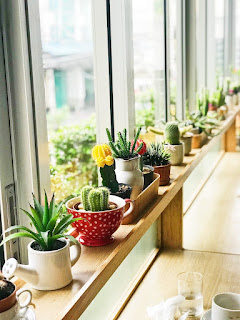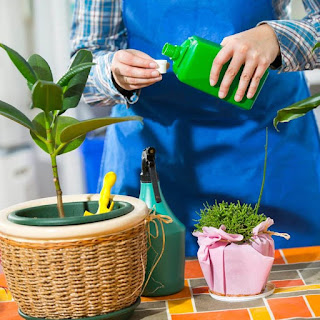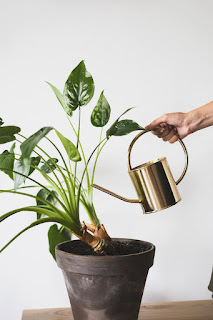However, I am mindful that a good number of readers are outdoor gardeners who also have greenery throughout their homes and, then, there are our green-thumbed condominium and apartment dwellers who might want a suggestion or two for the care of their own indoor plants.
I try to provide folks what they ask for (as well as what they need). So, here are a few tips I have learned through decades of growing lingering anemic plants or totally dispatching them. In general, realize that indoor plants and outdoor plants that are brought indoors cannot be treated as you would outdoor plants. This means extra attention is needed for certain requirements..
Choose plants based on your light
Assuming you purchase the majority of your own plants, determining their place in the home and the window next to which they will repose should always be a consideration before your buy.
Choose plants based on your light
 |
| Pixels.com |
If you are not sure, your first question should be, “What direction does that window face?” Most indoor plants prefer south-facing windows that offer bright, indirect light for most of the day (Think Cacti, Croton, Jade Plant, Ponytail Plant, succulents, etc.).
East- and west-facing windows provide partial sunshine, with the former offering a more gentle light (Think Anthurium, Boston Fern, Butterfly Palm, Calathea, Fiddle Leaf Fig, Hoya, Kalanchoe and Monstera, etc.) and the latter with a harsher afternoon light (Think Aechmea, Aloe Vera, Bird-of-Paradise, Christmas/Thanksgiving and Easter Cactus, Dieffenbachia, English Ivy, Strawberry Begonia, Ti Plants, etc.).
North-facing windows will offer low light (Think Golden Pothos, ferns, Peace Lily, Pinstripe Calathea, Moth Orchid, Snake Plant, ZZ Plant, etc.). When possible, with all indoor plants, remember to do a quarter-turn of plant container every month so that all areas will receive the same amount of sunshine and avoid ‘The Lean’ toward the window.
Know when to skip the fertilizer
Be conservative when using fertilizer on your houseplants. Too much fertilizer can do more harm than good. Houseplants tend not to need nearly as much fertilizer as outdoor plants.
Did you know that it is better to underwater your plants than to overwater them? Over watering can lead to root rot and, ultimately, plant death. Use a watering calendar, rather than a ‘To Do List,’ as a reminder.
Finally, repotting doesn’t need to be a right-of-passage for the indoor gardener. It doesn’t necessarily mean tearing the plant apart and putting it in a new container(s). It could be a simple matter of changing out the container’s soil with a fresh potting mix to provide new nutrients.
If you have questions concerning this article or would like to suggest a topic for a future column, contact your WSU Master Gardener, Bruce Bennett, at gardenguy4u@gmail.com. See you next month!
Know when to skip the fertilizer
 |
| Photo courtesy FamilyHandyMan.com |
If you choose to fertilize your plant, it’s best to do so during the growing season (April to October) and follow the general rule of thumb of ‘less is more’.
Consider using half the amount of fertilizer recommended on the package. I have a preference for water-soluble fertilizers, but, an annual once-and-done granular, organic fertilizer is also a possibility.
If you have a new plant or you recently changed the potting soil, forget about fertilizer for a year. There’s enough in the pot already.
Water needs change throughout the year.
 |
| Pixels.com |
The easiest process is to stick one (unmanicured) finger two inches into a container’s soil to determine if the soil is moist. If it is dry that far down, it’s time to just add water. If manicured fingers are an integral part of your life, consider investing in a moisture meter. They are cheap enough at a box store.
How often you water will also change throughout the year. Plants need less water in the winter months, when they’re growing slower and the home is cooler.
How often you water will also change throughout the year. Plants need less water in the winter months, when they’re growing slower and the home is cooler.
If the heat is on in the house and the potting soil is drying out quicker, they may need a bit more water. Wilting leaves or soil that looks pulled away from the sides of the planter are signs of a water-stressed plant. Use warm water as it absorbs into the soil the best.
Keep drainage in mind
Keep drainage in mind
If you tend to have a heavy hand when watering your plants, definitely keep drainage in mind.
You can opt for a planter with a drainage hole and saucer, or keep your plant in a grow-pot snuggled inside of a larger planter, or add pebbles or gravel to the bottom of a planter with a drainage hole.
The excess water will drain into the pebbles, evaporate and create beneficial humidity for the plant.
Do what works best for you!
Don't be afraid to try different methods for different plants.
Don’t worry about repotting
 |
| pixels.com |
Depending on how actively they are growing, plants typically need to be repotted every 18 to 24 months. If your plant has outgrown its current container, you can also use this as the justification to ‘size up.’
Choose a planter that is 1 to 3 inches larger than the current one being used. You don’t want your plant roots swimming in soil. This could actually delay growth. You want just a little extra space for them to grow. And, yet, some other plants prefer to be pot-bound.
Remember to do your horticultural research about specific requirements for each plant you own! They will appreciate your diligence and you’ll appreciate their increasing beauty. It’s a win-win situation, and, isn’t that what we strive for in life? For some reason, life is hardly ever that easy. But, these five tips can easily help to keep your plants healthy and make you look like a house plant star. You rock!
If you have questions concerning this article or would like to suggest a topic for a future column, contact your WSU Master Gardener, Bruce Bennett, at gardenguy4u@gmail.com. See you next month!



Thank you for this article with the indoor plant growing tips. I found it useful.
ReplyDelete